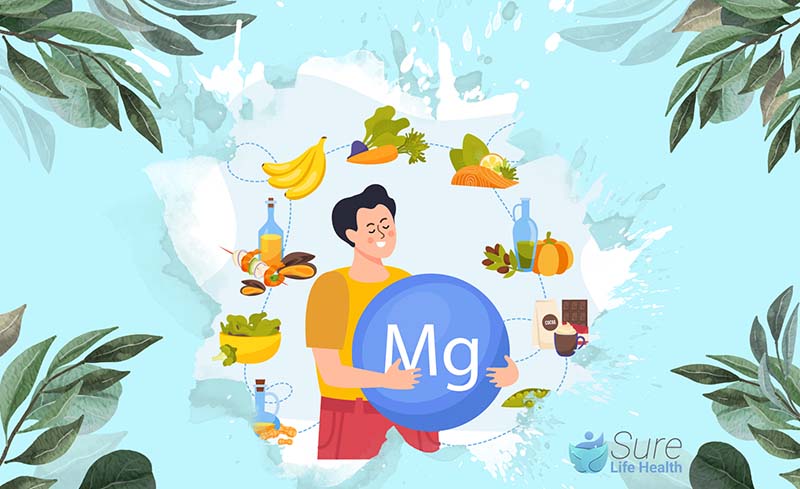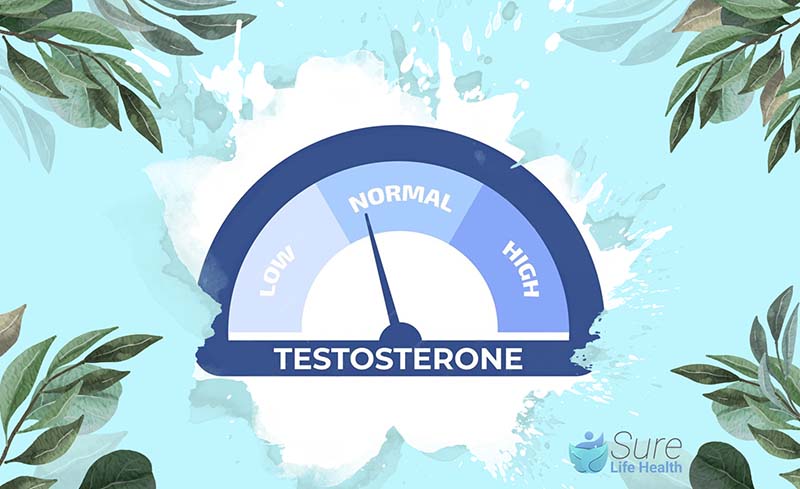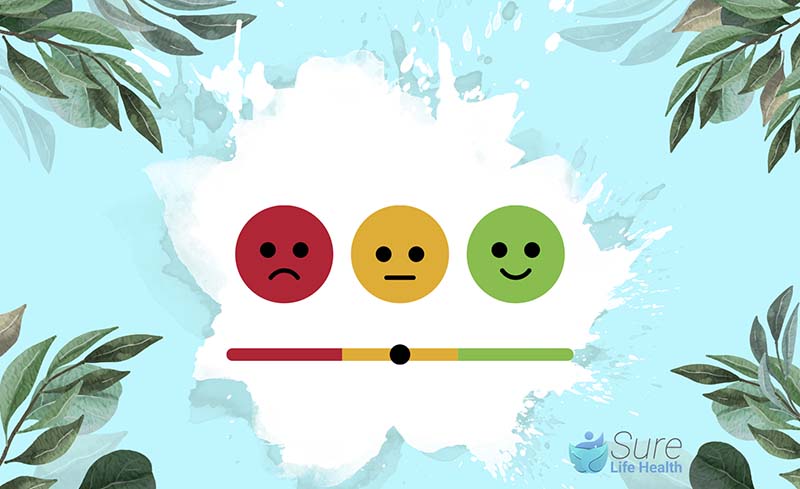Magnesium is a crucial mineral that offers a myriad of health benefits, including the potential to enhance testosterone levels in men. Beyond its role in testosterone improvement, magnesium contributes to muscle strength, improved sleep quality, and the regulation of blood glucose levels.
These advantages are significant for various demographics of men, encompassing those engaged in physical fitness, aging individuals, or those with sedentary lifestyles.
In this article, we’ll look at the scientific evidence that shows how magnesium can boost testosterone levels. We’ll see how taking magnesium supplements or making sure you get enough of it through your diet can improve testosterone, which in turn benefits your overall health and wellness.
Does Magnesium Help With Testosterone?
Magnesium is essential for maintaining healthy testosterone levels in men, with aging, lifestyle, and nutrient deficiencies affecting testosterone. The recommended daily magnesium intake is around 400-420 mg, crucial for testosterone production. A 2011 study involving 455 men aged 65 and older demonstrated that adequate magnesium intake boosts testosterone levels by enhancing the secretion of anabolic hormones, such as IGF-1.
Research indicates that magnesium levels decrease with age due to reduced dietary absorption, impacting testosterone production. This leads to issues like weaker bones and muscles, slower metabolism, and increased fatigue. Ensuring enough magnesium intake is vital for optimal testosterone levels and overall health, emphasizing magnesium’s role in men’s health.

How Does Magnesium Help Improve Testosterone?
Research has uncovered how magnesium supports the increase in testosterone levels within the body. Typically, a significant portion of testosterone is bound by a blood protein called sex hormone binding globulin (SHBG), with around 70% of it bound and another 28% attached to other cells. This leaves only about 2% of the hormone freely available or “free” in the bloodstream.
Here’s where magnesium steps in. This essential mineral works by inhibiting SHBG from binding with testosterone, thereby increasing the amount of free testosterone circulating in the blood in men. By reducing the binding of testosterone to SHBG, magnesium effectively enhances the availability and effectiveness of testosterone in the body, leading to potential improvements in various aspects of male health and vitality.

Why You Should Take Magnesium Supplements?
There are several compelling reasons to consider incorporating magnesium supplements into your daily routine:
Supports Exercise Performance
During physical activity, your body may require more magnesium than when at rest. Magnesium aids in transporting blood sugar into muscles and eliminating lactate buildup, which can cause fatigue.
Studies suggest that magnesium supplementation can enhance exercise performance, especially in older adults and those deficient in this nutrient.

Supports Cardiovascular Health
Magnesium is crucial for maintaining muscle health, including the heart. Research indicates that magnesium deficiency can increase the risk of cardiovascular issues.
Supplementing with magnesium has been linked to lower mortality rates post-heart attack and is used in treating congestive heart failure to reduce the risk of abnormal heart rhythms.
Helps Improve Energy Levels
Magnesium is essential for producing and stabilizing ATP molecules, which provide energy for various bodily functions.
It also aids in converting glucose into energy, thereby helping to maintain stable energy levels and prevent fatigue.
Improves Bone Strength
Alongside calcium, magnesium plays a vital role in supporting bone health by influencing bone formation and regulating calcium levels.
Studies suggest that increasing magnesium intake can improve bone mineral density, though more research is needed on its role in managing osteoporosis.

Supports Muscle Development
Magnesium is involved in the production of insulin-like growth factor (IGF-1), crucial for muscle growth and strength, particularly in older adults.
Additionally, it helps muscles contract and relax properly, preventing cramps and spasms.

Promotes Healthy Sleep Cycles
Magnesium may improve sleep quality by aiding relaxation and regulating melatonin levels.
Studies have shown that magnesium supplementation can help individuals fall asleep faster, improve sleep quality, and reduce symptoms of insomnia.
Helps Stabilize Mood
Low magnesium levels have been linked to depression, leading researchers to investigate its potential in alleviating symptoms.
Some studies suggest that magnesium supplementation may reduce depressive and anxiety symptoms, though more robust research is needed.

Incorporating magnesium supplements into your daily routine may offer a range of benefits, from supporting exercise performance and cardiovascular health to improving energy levels, bone strength, muscle development, sleep quality, and mood stability. However, it’s important to consult with a healthcare professional before starting any new supplement regimen, especially if you have underlying health conditions or are taking medications.
How Much Magnesium to Increase Testosterone?
Studies have indicated that magnesium supplementation can potentially raise testosterone levels in men. It’s suggested that men aim for a daily intake of 400–420 mg of magnesium, sourced from food sources, supplements, or a combination of both.
However, it’s crucial to maintain a balanced intake, as having either too much or too little magnesium can pose health risks. Therefore, it’s advisable to consult with a healthcare professional before starting any new supplement regimen to ensure it aligns with your individual health needs and considerations.
Conclusion
Based on a comprehensive review of research studies and evidence, it is evident that magnesium supplementation is associated with testosterone levels. Adequate magnesium levels in the body have been linked to increased levels of both free and total testosterone in the bloodstream.
Healthy testosterone levels can result in numerous positive changes in men’s bodies, including enhanced strength, muscle development, improved mood, and increased athletic performance. This explains why many high-quality testosterone boosters include magnesium as a key ingredient.
In summary, ensuring sufficient magnesium intake through supplementation or diet can support optimal testosterone levels, contributing to overall health and well-being in men.
Be sure to explore more insightful blogs from Sure Life Health, where we continue to shed light on the latest trends and breakthroughs in health and wellness..
Professor Gaye Cunnane, PhD, MB, FRCPI
As the Director of Health and Wellbeing at RCPI, Professor Gaye Cunnane is at the helm of initiatives aimed at enhancing the health and well-being of RCPI Trainers and Trainees. Her role extends beyond administration; she is also a respected clinical professor of rheumatology and a consultant rheumatologist at Trinity College Dublin (TCD) and St James’s Hospital. Prof. Cunnane’s medical journey began at TCD, where she graduated from medical school, and her path has been marked by both clinical and academic excellence.
After completing her basic clinical training in medicine, she embarked on PhD studies at University College Dublin and St Vincent’s University Hospital. Her research during this period was focused on prognostic markers in early inflammatory arthritis, a project that saw her collaborating with esteemed universities across Europe, including in Switzerland, The Netherlands, the UK, and Sweden.
Prof. Cunnane’s career took her to the University of California, San Francisco, where she spent three years delving into research on new treatments for lupus. Her academic prowess led her to the University of Leeds in 2001 as a senior lecturer, before returning to Ireland in 2003 to assume her current roles. She has also served as the National Specialty Director for Rheumatology training in Ireland, Programme Director for Basic Specialist Training with RCPI, and as a past President of the Irish Society for Rheumatology.
PUBLISHED ARTICLES
“Rheumatic disease differentiation using immunoglobulin G sugar printing by high-density electrophoresis”: Published in The Journal of Rheumatology, this study reflects her in-depth investigation into rheumatic diseases.
“Benefits of exercise in patients with rheumatoid arthritis: a randomized controlled trial”: This research work, highlighting the positive impact of exercise on rheumatoid arthritis, underscores Prof. Cunnane’s dedication to practical, patient-centered research.
Additionally, Prof. Cunnane has made notable contributions to the Annals of the Rheumatic Diseases, discussing early referral, diagnosis, and treatment of rheumatoid arthritis. She has also been involved in a study on the NCBI platform investigating exercise benefits in rheumatoid arthritis patients.
Professor Gaye Cunnane’s career is a testament to her commitment to improving patient outcomes in rheumatology through rigorous research, clinical excellence, and dedicated teaching. Her work continues to influence the field of rheumatology, both in Ireland and internationally.

